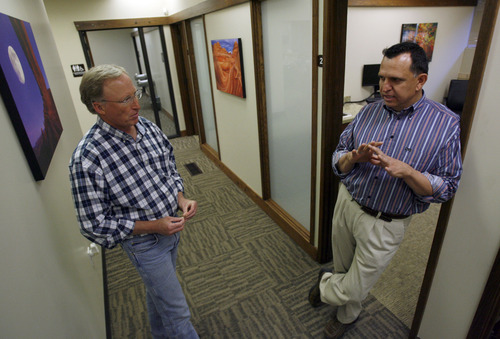This is an archived article that was published on sltrib.com in 2013, and information in the article may be outdated. It is provided only for personal research purposes and may not be reprinted.
A group of doctors is working with the Confederated Tribes of the Goshute to open a family health clinic in downtown Salt Lake City.
Sacred Circle Health Care will be the first tribe-owned clinic located outside a reservation in Utah, say its founders. But that's not all that sets it apart.
The clinic is designed to be a moneymaker for the tribe — with the profits used to improve tribal members' access to health care no matter where they reside.
"Any money made by the Goshutes has to go to health care," said John Lopez, a retired dentist and the clinic's manager. "I don't know what their vision is, but I would love to see them have an upgraded clinic, get dental care and provide nutritional counseling for diabetes on the reservation."
American Indians have the shortest life expectancy in Utah, according to the state Department of Health.
They have higher rates of diabetes, and their chances of dying from complications of the disease are nearly double the state's rate. They are more prone to use tobacco and have asthma.
And though more Latinos are uninsured, American Indians are the most likely to report problems with accessing health care.
"We have a small clinic here in Ibapah serving our population and Native Americans who live in and around Wendover," said Goshute Chairman Ed Naranjo. But it offers no dental care, a doctor is on site only twice a month and Naranjo said it's too isolated to be of any use to urban Indians.
Half of Utah's 33,000 American Indians live along the densely populated Wasatch Front, according to the U.S. Census.
Sacred Circle Health Care was financed by a group of doctors who formerly worked for the Indian Health Service, including Vernal dentist David Hadley.
But it operates under the tribe's "638 Indian Health Services" contract of the Goshutes, which will get an undisclosed cut of any profits.
"I wanted to improve health services, especially for kids," said Hadley, who tapped former Utah Bureau of Indian Affairs Chairman Thomas Sawyer to navigate regulatory hurdles.
Sacred Circle isn't open yet, but it is scheduling appointments and was blessed by tribal elders Thursday evening in a private ceremony.
Located in 3,800 square feet of rented office space at 200 East and 620 South, the clinic has four exam rooms, four dental suites and a pharmacy for patients' use only. It still smells of new carpet.
The group of four board-certified family doctors and dentists has access to another 6,000 square feet and plans one day to add mental health services, eye care and a full-service lab.
"When I agreed to help, I said, 'It's going to be nice. We're not going to have granite counter tops, but I'm not doing this on the cheap,' " said Lopez, who grew up poor and on Medicaid.
Though designed to serve the American Indian population, the clinic will treat all paying customers and has clearance to bill Medicaid, Medicare and a host of private insurers.
And it will benefit from higher Medicaid payments that the federal government grants tribally operated clinics. The higher payment rate will apply to all of the clinic's Medicaid patients, not just American Indians.
It's also bound to capitalize on the influx of Utahns expected to sign up for health coverage in 2014 under a requirement of federal health reform.
"Now we just need patients," said Lopez.



